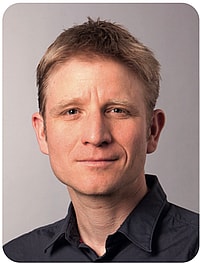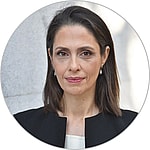- Get directions
- Leave a review
- Claim listing
- Bookmark
- Share
- Report
- prev
- next
- Tuesday, April 23, 2024 @ 11:00 am
ETH Zurich bioethics professor Effy Vayena has experience collaborating across many different cultures. She talks about the value of cooperation and the international role of Swiss researchers.

Florian Fisch
Swiss National Science Foundation | Science editor

Effy Vayena, Multicultural expert in health data policy
Greek-Swiss dual citizen Effy Vayena studied the history of medicine and bioethics in Greece, the UK, the USA and Switzerland. After completing her doctoral degree in the history of science at the University of Minnesota, she worked in a research position at the WHO in Geneva. She assumed the role of assistant professor at the University of Zurich in 2015, funded by the SNSF professorship program. Dr. Vayena is now professor of bioethics at ETH Zurich, with her work supported by continued grants from the SNSF.
FF: Professor Vayena, you grew up in Greece, and completed your doctoral degree on the history of medicine in the United States. What brought you to Switzerland?
EV: Searching for a postdoctoral position, I discovered a relevant research program at the WHO. I moved to Geneva, initially for one year, but in the end spent seven years working at the WHO. I then returned to academia, at the University of Zurich where I conducted research in the area of bioethics and health policy.
FF: Today you successfully lead an international research program called Health Data Governance and Value Creation. What is its overall goal?
EV: In this program we study responsible access to health data for research purposes. The project began before artificial intelligence became an everyday term. Keep in mind that health data are even more sensitive than other personal information. The process we developed for ethical data access extends to the use of health data collected outside of hospitals and clinical medical records. Using this type of data quickly becomes an international matter, with healthrelated apps often developed in a different country, and health data stored in yet another. ETH Zurich bioethics professor Effy Vayena has experience collaborating across many different cultures. She talks about the value of cooperation and the international role of Swiss researchers.
FF: Therefore, it makes sense to collaborate with researchers from other countries?
EV: Exactly. We are a consortium of individuals and groups in Switzerland and Singapore, and we collaborate with teams throughout Europe. It is vital to include the unique perspective of each country and combine the strengths of various disciplines. Science is competitive and collaborative at the same time.
FF: What are the advantages of working in consortia?
EV: The funding of a consortium allows for a broader strategy, with individuals and institutions assembled to think about the same problem. There are also many consortia purely within Switzerland. Consortia can be as simple as two co-principal investigators, and often include non-academic partners such as companies or individuals working in government.
FF: You know different working cultures firsthand. How do they influence teamwork?
EV: I try to work with people I think I can collaborate with well, so clearly there is a selection bias in my experience. Of course, each culture is distinct, and culture also varies by research institution. Germany, South Africa, and the United States have different administrative requirements, ways of organizing meetings, and institutional hierarchies. We must ensure that partners from the Global South are included in scientific collaboration.
FF: Is Switzerland a good country for research collaboration?
EV: Working here, I may be biased, but in my experience Switzerland is a very good country for collaboration. There is a rich research culture, and Swiss society values science. Administration is concise and lean without unnecessary paperwork, which is a big asset. Switzerland is also an attractive partner in terms of infrastructure. There is a vibrant scientific research industry and a culture of innovation. If you look at various metrics, from university rankings to innovation indices, Switzerland continuously features in the top league. Achieving this takes time and cannot just be created overnight. Of course, it varies according to the area of research. And especially concerning data access, Switzerland still has a few challenges to overcome.
FF: You are talking about health data. Switzerland does not have a biobank with a cohort of 500,000 people like the UK, or access to all individual health records like Denmark. We still work with PDF files.
EV: We indeed have some way to go. However this has been recognized, and there is a strong commitment to improving access to health data. The first task of the Swiss Personalized Health Network, for example, was to enable data access from university hospitals. As each hospital records and annotates information differently, this required a great deal of work. On the other hand, it is difficult to compete with the UK and Denmark when it comes to data access, as they have very different healthcare systems from Switzerland. These systems allowed more centralized collection of data from early on.
FF: Are Swiss researchers forced to collaborate because of our geographical situation?
EV: For any science-oriented society, it is essential to look beyond our borders and collaborate. The neighboring countries are also strong in science and innovation. Our unique political system is an enormous asset, helping to shape society’s opinions and actions. Flexibility and agility are two advantages of being a small country, and these attributes are valuable for scientific collaboration.
FF: Let’s talk about Horizon Europe, the largest research program in the world. While some parts of the program are still open to Swiss researchers, they are currently excluded from important areas. Do you feel the consequences during your work?
EV: Switzerland has been the beneficiary of the work of the Horizon Europe initiative. Not only in terms of funding, but more so the significant effects of competition and collaboration. Having a similar level of expertise, but lacking the ability to participate as an equal partner, results in a poor dynamic for cooperation. We researchers are hopeful to re-enter the initiative.
Swiss basic research depends on international collaboration
European Research Framework Program Horizon Europe is the world’s biggest research funding scheme. Switzerland has been excluded from important parts of the program for the second time since June 2021. A swift renewed association is necessary to avoid damaging the Swiss research landscape further. Still, the SNSF supports the participation in the areas of the European program that are still available and supports other international collaboration possibilities. A selection of SNSF funding schemes:
- Scientific Exchanges: invite colleagues from abroad or host events in Switzerland
- COST Actions and Projects: networking activities and collaborations with researchers from COST member countries
- Mobility grants for PhD students and postdocs: support early-career researchers to perform research abroad
- Weave/Lead Agency: financing of joint projects across borders between two or three countries where agreements exist
- SOR4D: mixed-consortia with researchers from the least developed, low and lower-income countries
- SPIRIT: two to four research groups across borders with development assistance recipient countries
A selection of other international collaborations available to Swiss researchers:
- Bio-Based Industries: partnership between the EU and biotech industry
- Innovative Medicines Initiative: partnership between the EU and healthcare industry associations
- EMBL: collaboration around the European molecular research laboratory in Heidelberg
- Human Frontier Science Program: funding for European basic research in life sciences
- ESRF: European synchrotron light source in Grenoble for x-ray related collaboration
- CERN: nuclear physicists from around the world meet at the European particle physics collaboration in Geneva
- Euratom: the EU’s European nuclear energy program also funds European research
- ESO: European astronomical research in Chile is where astronomical research from Europe coalesces